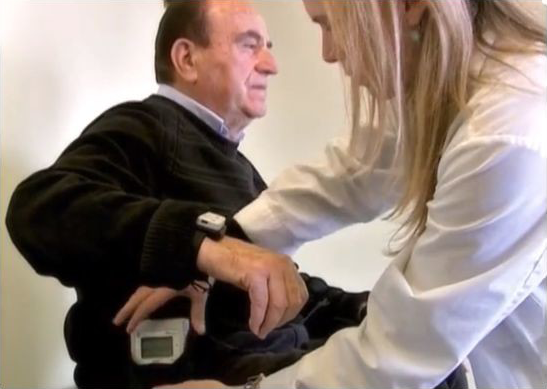
While there is no cure for Parkinson’s, certain drugs and neurostimulators can help manage the symptoms of the disease. Since symptoms guide the choice of therapies, researchers at Technical University of Madrid in Spain have tinkered together a body area network of sensors and special smartphone apps to objectively assess Parkinson’s patients from the comfort of their home.
 The PERFORM system uses a number of accelerometers worn by the person being studied. The data is passed via the smartphone to a hospital where a compiled daily report is reviewed by clinicians. Unusual changes in a person’s symptoms from day to day are automatically flagged so that physicians give the data a keener look. The researchers behind the PERFORM system have been testing the device with actual patients and report that people are pretty comfortable with the sensor network and the data may help monitor such folks over extended periods.
The PERFORM system uses a number of accelerometers worn by the person being studied. The data is passed via the smartphone to a hospital where a compiled daily report is reviewed by clinicians. Unusual changes in a person’s symptoms from day to day are automatically flagged so that physicians give the data a keener look. The researchers behind the PERFORM system have been testing the device with actual patients and report that people are pretty comfortable with the sensor network and the data may help monitor such folks over extended periods.
From the study abstract:
In this work the compliance of a telehealth system for the remote monitoring of Parkinson’s disease (PD) patients is presented with testing in 32 PD patients. This system, called PERFORM, is based on a Body Area Network (BAN) of sensors which has already been validated both from the technical and clinical point for view. Diverse methodologies (REBA, Borg and CRS scales in combination with a body map) are employed to study the comfort, biomechanical and physiological effects of the system. The test results allow us to conclude that the acceptance of this system is satisfactory with all the levels of effect on each component scoring in the lowest ranges. This study also provided useful insights and guidelines to lead to redesign of the system to improve patient compliance.
Study in journal Sensors: Wearability Assessment of a Wearable System for Parkinson’s Disease Remote Monitoring Based on a Body Area Network of Sensors…
Technical University of Madrid: New technologies to help patients with Parkinson’s disease…
The post Network of Motion Sensors Monitors Progression of Parkinson’s appeared first on Medgadget.
